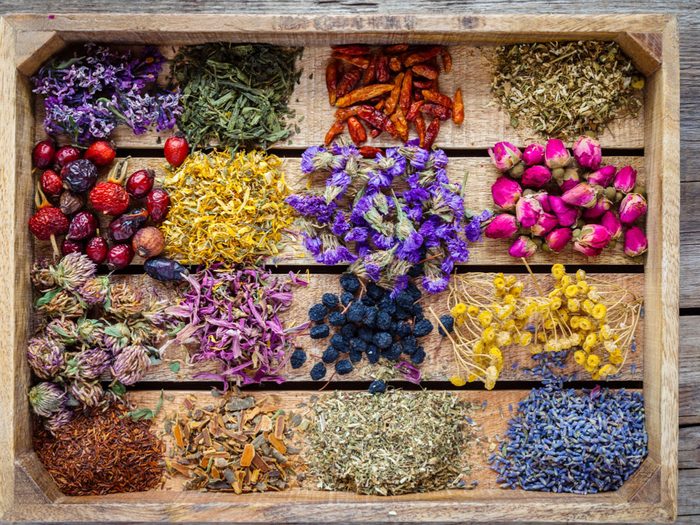
The herbal remedies that may benefit your health
If you’re only using herbs to boost the flavour in your food, you may be missing out on a slew of untapped health benefits.
Herbal remedies – using the seeds, berries, roots, leaves, bark or flowers of a plant for medicinal purposes – have been used in practice in China, India, Egypt and North America for centuries. Today, as more and more clinical studies are proving the efficacy of certain herbs, what had once been dismissed, science is now finding as a legitimate treatment option for a number of different conditions.
Ian Lloyd, a pharmacist and pharmacy owner in Victoria, BC, says that 80 per cent of his patients are now using herbals, and they’re predominately women.
“As a pharmacist, I’m always looking at the clinical evidence, and there is good indication that herbals can help for certain issues,” he says. “Plus, my patients are constantly asking about herbals because they want to take charge of their health.”
For those who are interested in exploring herbals, options abound. In addition to supplements, herbals can be consumed in teas, tinctures and topical treatments. You might have to experiment to find what works best for you. Tinctures, for example, are highly concentrated and more easily digested than supplements but often have a bitter alcohol base. Talk to a certified naturopath, herbalist or other healthcare provider trained in herbal medicine to determine the best format and dosage for you.
As with any new treatment, it’s essential to let your pharmacist, physician and other healthcare providers know about any herbals you’re considering in case they interact with other medications, says Lloyd. For example, herbs like feverfew and ginkgo biloba shouldn’t be mixed with warfarin and other blood thinners because the combination increases your risk of bleeding.
Ready to learn more? Here are some common conditions and the herbs that may help.
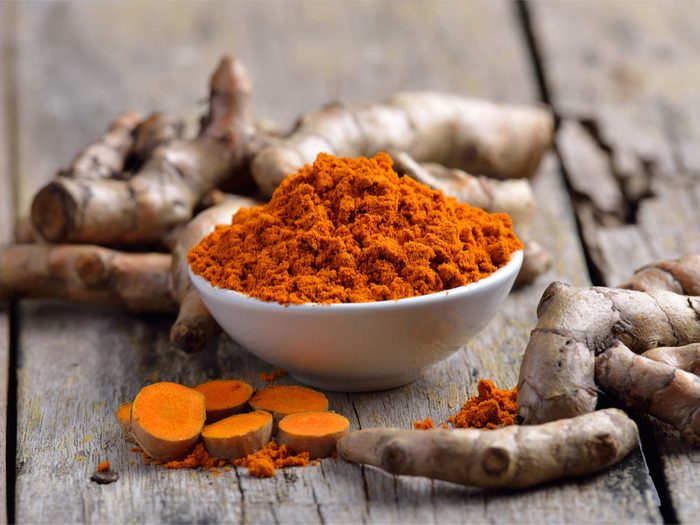
Herbal remedies for inflammation
When it comes to the origins of many diseases, including arthritis, cancer, diabetes and depression, chronic inflammation is never a good thing. But turmeric, the main spice found in curries that comes from the turmeric plant, is proving to be a powerful anti-inflammatory agent. In several clinical studies, a component of turmeric called curcumin was shown to lower the levels of enzymes in the body that cause inflammation.
A powerful antioxidant that’s stronger than vitamins C and E, this herb is lauded for boosting the immune system and can be taken daily on a long-term basis. “Turmeric is one of those herbs that can benefit everyone because inflammation is the root of all evil,” says Madalyn Johnson, an herbalist and co-owner of SW Herb Shop in Mesa, AZ. “Everything in the body, including the brain, is affected by inflammation.”
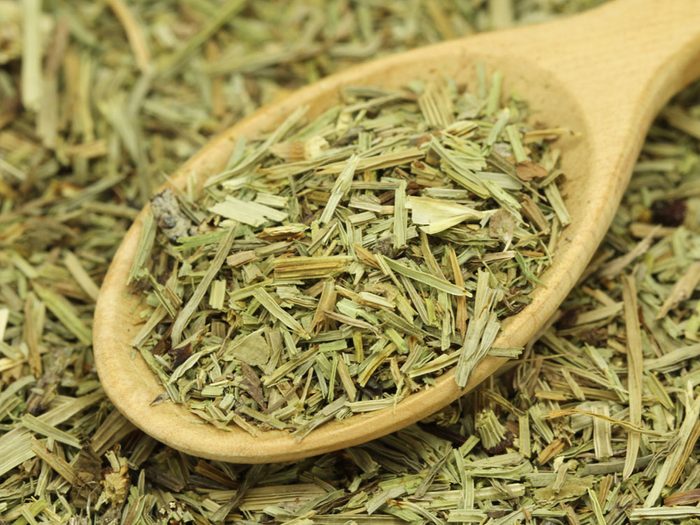
Herbal remedies for problem skin
Many skin issues, such as acne and eczema, begin from the inside out, says Bob Mehr, owner of Pure Integrative Pharmacy, a chain of pharmacies in British Columbia that combines traditional and conventional medications. “I always give my patients something to support liver and gut detoxification and, within two or three months, their skin symptoms go away,” says Mehr. (In dire need of a full body detox? These are the best herbs to do so the natural way.)
Johnson agrees and often recommends turning to a liver cleanse tea, comprised of herbs like dandelion and burdock root, to clear up skin issues.
Another powerful herb used for problem skin that’s native to the Arizona region is chaparral. This antioxidant is developed into a tincture and added topically to soothe skin rashes and burns. It’s especially beneficial for people with eczema and psoriasis.
If wrinkles are your issue, herbs like calendula, horsetail and hawthorn can help stimulate and stabilize the body’s collagen production, which declines naturally as we age.
Flaxseed oil, derived from the flax crop and applied topically, is another herb recommended for smooth, clear skin.
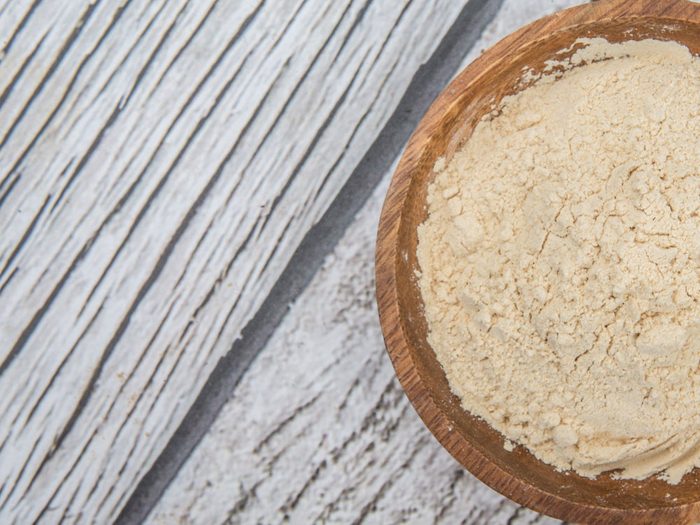
Herbal remedies to boost your energy
If you are getting enough sleep and still feel sluggish, maca may be a herb worth considering. Derived from a plant that grows on the highest plateaus of the Andes mountains, it has been touted for enhancing energy, stamina and even sexual libido.
It has been traditionally used to balance female hormones and clinical studies have shown its effectiveness at treating menopause symptoms.
“Here at the shop, we use it as a daily tonic and it gives us sustained energy to get through the day,” says Johnson. “If someone is tired, the first thing we look to is maca.”
Another popular energy booster that has some clinical research to back it up is ginseng. Large quantities of data collected from human and animal studies show that this herb, which is found in North America and eastern Asia, can significantly increase physical and intellectual capacity.
But be sure to excercise some caution: Some pharmacists warn against using it for prolonged periods of time because it can cause headaches, upset stomach and menstrual changes. Since ginseng is powerful stuff, avoid taking it with stimulants (like caffeine) and check with your doctor to see if it’s safe for you before trying it.
Another way to use ginseng is in your breakfast – and trust us, you will not be disappointed with this easy brekkie idea.)
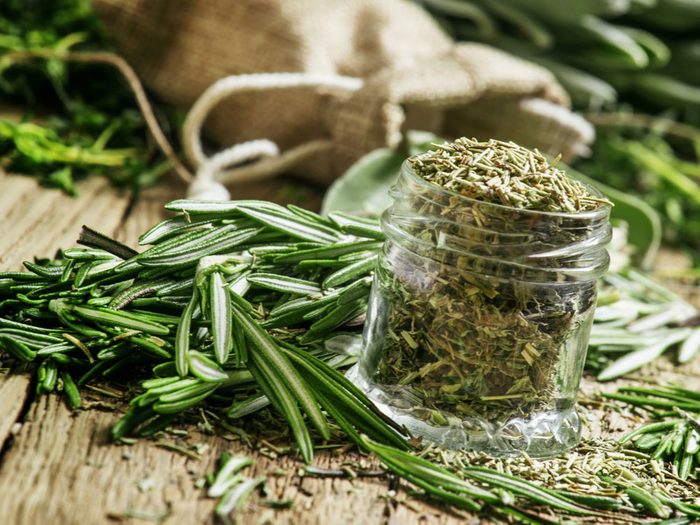
Herbal remedies to block brain fog
Shakespeare had it right back in the 1600s when he wrote “There’s rosemary, that’s for remembrance” in Hamlet.
According to a recent study from Northumbria University in the U.K., smelling rosemary improves memory in seniors b15 per cent. (Now rosemary isn’t the only thing that can improve your memory, these 12 foods can also help boost your brain power.)
A natural extract derived from the leaf of the Chinese ginkgo tree, ginkgo biloba is another herb commonly used in Chinese medicine to treat declining memory and improve focus. Mehr says the herb is excellent for overall brain health because it promotes good blood circulation throughout the brain.
He’s also a fan of acetyl-L-carnitine, an antioxidant available in supplement form that has been shown to benefit cognitive ability, memory and mood in clinical studies. He says it works best when combined with coenzyme Q10, which is used by cells to produce energy needed for cell growth.
